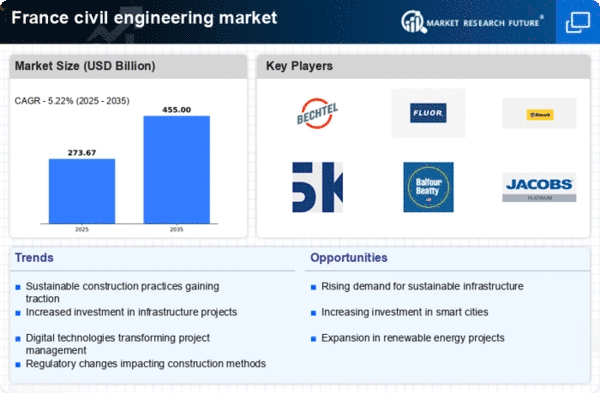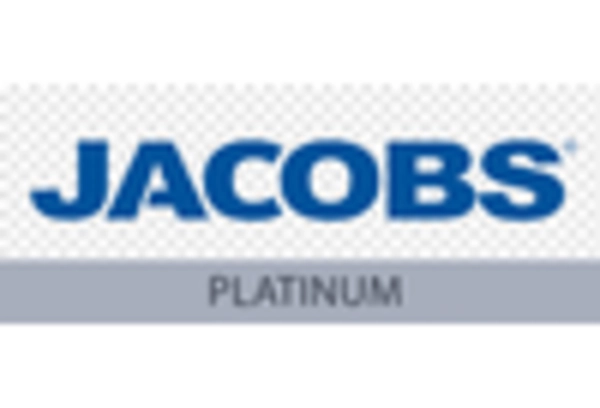Infrastructure Investment Surge
The civil engineering market in France is currently experiencing a surge in infrastructure investment. This surge is driven by government initiatives aimed at modernizing transportation networks and public facilities. The French government has allocated approximately €50 billion for infrastructure projects over the next five years, which is expected to stimulate growth in the civil engineering market. This investment is likely to enhance the quality of roads, bridges, and public transport systems, thereby increasing demand for civil engineering services. Furthermore, the focus on sustainable infrastructure development may lead to innovative construction methods and materials, further propelling the civil engineering market. As urbanization continues to rise, the need for robust infrastructure becomes increasingly critical, suggesting a positive outlook for civil engineering firms in France.
Regulatory Framework Enhancements
Recent enhancements in the regulatory framework governing construction and civil engineering practices in France appear to be influencing the civil engineering market positively. The government has introduced new regulations aimed at improving safety standards and environmental sustainability in construction projects. These regulations may require civil engineering firms to adopt advanced technologies and methodologies, potentially increasing operational costs but also enhancing project quality. The civil engineering market is likely to benefit from these changes as firms that comply with regulations may gain a competitive edge. Additionally, The emphasis on sustainable practices could lead to increased funding opportunities for projects that align with government priorities. This alignment fosters growth in the civil engineering market.
Urbanization and Population Growth
Urbanization and population growth in France are significant drivers of the civil engineering market. As cities expand and populations increase, the demand for housing, transportation, and public services intensifies. The French population is projected to reach approximately 70 million by 2030, necessitating substantial investments in urban infrastructure. This demographic shift is likely to create opportunities for civil engineering firms to engage in large-scale projects, including residential developments and transportation networks. Moreover, the civil engineering market may see a rise in demand for innovative solutions to address challenges such as traffic congestion and environmental sustainability. Consequently, urbanization is expected to remain a key factor influencing the growth trajectory of the civil engineering market.
Focus on Resilience and Climate Adaptation
The civil engineering market in France is increasingly focusing on resilience. Climate adaptation strategies are also a priority. With the growing awareness of climate change impacts, there is a pressing need for infrastructure that can withstand extreme weather events. The French government is prioritizing investments in resilient infrastructure, which may include flood defenses, heat-resistant materials, and sustainable drainage systems. This focus on climate adaptation is likely to drive demand for civil engineering services that specialize in designing and implementing such solutions. As a result, firms that can demonstrate expertise in resilience planning may find themselves well-positioned in the evolving civil engineering market, catering to both public and private sector needs.
Technological Advancements in Construction
Technological advancements are reshaping the civil engineering market in France, with innovations such as Building Information Modeling (BIM) and advanced materials gaining traction. These technologies enhance project efficiency, reduce costs, and improve collaboration among stakeholders. The integration of digital tools in project management is likely to streamline processes, thereby increasing productivity within the civil engineering market. Furthermore, the adoption of smart construction techniques may lead to more sustainable practices, aligning with the growing emphasis on environmental responsibility. As firms increasingly invest in technology, the civil engineering market is expected to evolve, potentially leading to a competitive advantage for those who embrace these advancements.
















